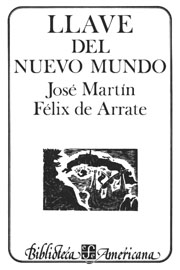1.2.1 The historiographical and poetic work of José Martín Félix de Arrate (1701 – 1765)

José Martín Félix de Arrate is undoubtedly one of the most important authors of the period. He explored various literary genres with relative success. His works include the tragedy “El Segundo Robido de Elena” (The Second Robbery of Elena), the “Novel of the Illustrious Martyr Saint Ciriaco” (The Key to the New World, Bulwark of the West Indies. Havana Described: News of Its Founding, Growth, and Condition).
In his historiographical texts, the use of a considerable amount of information is evident, although it is filtered according to his interests. His account of the Spanish conquest very superficially addresses the issue of cruelty and the extermination of the natives, a phenomenon viewed only from an economic perspective, since it would have been cheaper to reproduce the aboriginal populations rather than transporting Black people from Africa. Likewise, when criticizing slavery, his arguments have this same nature, but a more diluted ethical tone.
His texts do not yet reveal the contradictions between islanders and peninsulars that would later become antagonistic, and they are permeated with a laudatory tone toward the representative authorities of the Spanish Crown, to whom they are generally addressed. However, Arrate extols the virtues and exuberance of the land, dwells on the descriptions of native fruits and features of nature, and already refers to “our homeland” from an emotional perspective. Most notable in this regard are his ethological investigations into the Creoles, whom he characterizes and praises in a way that recalls—in truth, anticipates—the content of José Martí’s “Vindicación de Cuba.”
In terms of form, his writing broke with the Baroque and anticipated Neoclassicism by a few years, despite the scruffy style, as the author himself described it in the dedication to “Key to the New World…”. His poetic work—mostly unknown, except for the texts that appear in the body of other works—did not achieve any singular developments, but it deserves to be noted within the context of the period and the limited literary life of the country. The following sonnet appears as a colophon to the aforementioned historiographical work:
“Here I release the pen! Oh beloved homeland,
Noble Havana, enlightened city!
Well, if she flew quite well, presumptuous,
It is only fair that she retires in shame.
If to outline you, venerated homeland,
My poorly regulated pulse slowed down,
It does little to withdraw already run,
When it’s so much to leave you badly copied.
But even so he has not managed to snub you;
Well, if so much of your son is wise and strong
In the palaestras of Minerva and Mars
They credit and exalt you, it is well noted
Where have so many come to enlighten you,
I alone will not be enough to darken you.”
In short, his texts constitute primary documentary sources (further supported by the use of many others, some of which are currently unknown) for reconstructing the history of the earliest colonial period. Many later thinkers and writers would further develop ideas that were already evident or latent in Arrate’s historiographical corpus, so he can be considered a precursor in this regard.








